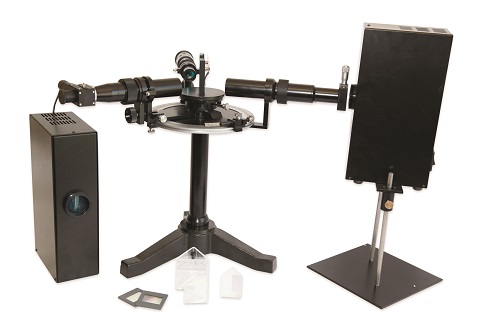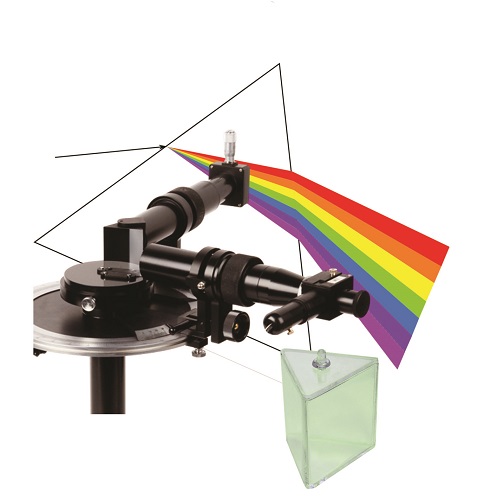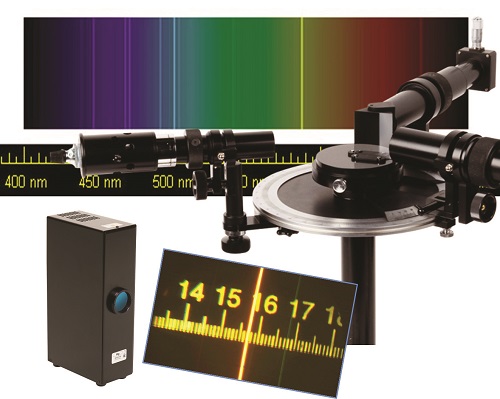Dispersion of prims and diffraction grattings : EXP200020 or EXP200021
Référence : EXP 200 020

The LEMARDELEY Spectrogoniometer, produced by Didalab, is the brand of a know-how that has never ceased to be upgraded in the last 40 years. On the agenda of preparatory classes(*), it is used to study prisms and diffraction gratings.
Equipped with a vernier scale engraved to an accuracy of one arc minute, with an autocollimator, a micrometric lens and a collimator with micrometric slit, it is a guarantee of fast and accurate learning. The didactic camera provided for this experiment is designed to capture the various dispersions and to use them as class demonstrations or for hands-in exercise reports.
REFRACTIVE INDEX
A prism is a cut glass block, classically made up of three surfaces on a triangular base. This optical instrument is used to
refract, reflect or disperse light. Dispersion and refraction depend on the index of the material used for the prism.
We offer a Crown glass prism (low-dispersion) and a Flint glass prism (high-dispersion), a hollow prism and a set of glass
prisms with an index to be determined. Students can thus cover the main types of prisms. The goniometer’s prism holder plate can be adapted to work with other prisms should you so wish.
DETERMINING GRATTING CONSTANT
A diffraction grating is an optical device made up of a series of parallel slits (transmission grating) or of reflecting stripes (reflection grating). These features are regularly spaced, and the spacing is known as the grating constant. Light dispersion will vary according to this constant: wide for a grating with a small constant and more concentrated for a grating with a larger constant. The goniometer’s micrometric slot allows accurate adjustment of the fineness of the
lines observed.
SPECTROMETRY - ANALYSING A SPECTRAL SOURCE
You can use a micrometric lens to measure wavelengths, in the same way as you use a SPID optical fibre spectrometer.
By means of this experiment, the spectrogoniometer becomes a genuine practical aid to link the gratings theory and the operation of fibre spectrometers widely used in all establishments. Moreover, this experiment reflects on implementation of a measurement system and the protocol to be set up to attain its target aim and accuracy. Since calculation of uncertainty is an essential part of preparatory classes (*), students can thus criticise a process that they themselves set up.
(*) : Preparortary classes (Classes Préparatoires aux Grandes Ecoles (CGPE) : two-year undergraduate intensive course in
mathematics and/or physics to prepare students for national competitive examinations for admission to to the top-ranking
higher education establishments.
SUBJECTS APPROACHED
»»Dispersion
»»Refractive index
»»Prism angle study
»»Setting the goniometer
»»Determining grating constant
»»Spectrometry – Analysing a spectral source
NECESSARY EQUIPMENT
COMPOSITION
EXP200021 Dispersion and diffraction (BASIC)
| Reference | Description | quantity | | POD068070 | Spectrogoniometer | 1 | | POD062000 | Paton gratings, 300 lines/mm | included | | POD062100 | Paton gratings, 600 lines/mm | included | | POD010620 | Hollow prism | 1 | | POD068020 | Extra dense Flint prism | included | | POD068030 | Crown prism | included | | POD010616 | Glass prism, 30-60-90° | 1 |
COMPOSITION
EXP200020 Dispersion and diffraction (COMPLETE)
| Reference | Description | quantity | | POD068070 | Spectrogoniometer | 1 | | POD010050 | Mercury spectral lamp, low pressure | 1 | | POD010058 | Sodium spectral lamp, low pressure | 1 | | POD010056 | Stand for spectral lamp | 1 | | POD062000 | Paton gratings, 300 lines/mm | included | | POD062100 | Paton gratings, 600 lines/mm | included | | POD010620 | Hollow prism | 1 | | POD068020 | Extra dense Flint prism | included | | POD068030 | Crown prism | included | | POD010616 | Glass prism, 30-60-90° | 1 | |
|




